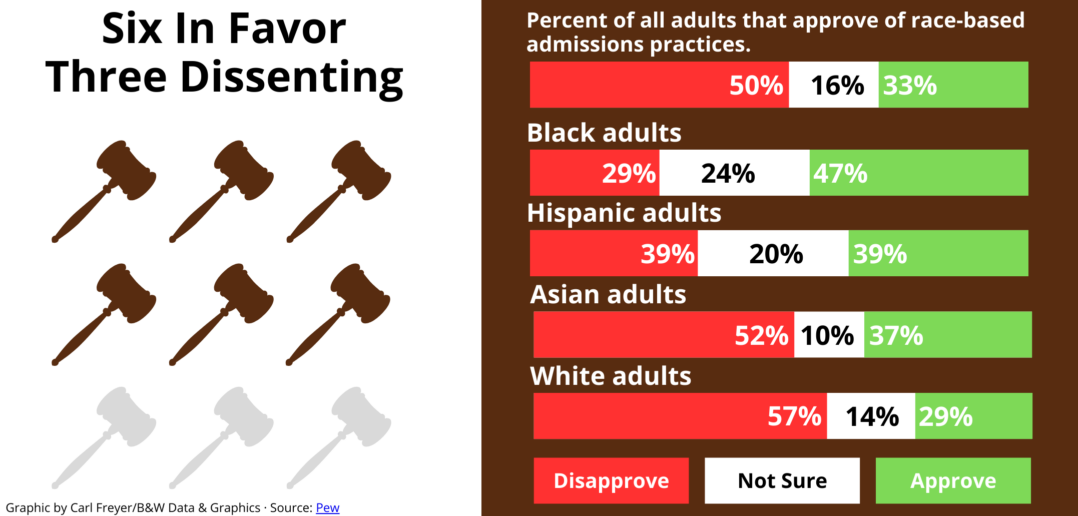Many institutions of higher education, including Lehigh, have been forced to re-evaluate their admissions practices following a Supreme Court ruling that struck down the former precedent of affirmative action.
In a 6-3 ruling, the justices found it unconstitutional to consider an applicant’s race as a factor in the college and university admissions process.
The Supreme Court ruled in June that both Harvard University and the University of North Carolina’s admissions policies were in violation of the Equal Protection Clause. According to the Legal Information Institute at Cornell Law School, this clause states no individual may be denied equal protection of governing laws from the governing bodies.
Chief Justice John Roberts wrote the court’s majority decision. He said Harvard University and the University of North Carolina failed to offer measurable objectives to justify the use of race.
Roberts wrote that for too long many universities have “wrongly concluded that the touchstone of an individual’s identity is not challenges bested, skills built or lessons learned, but the color of their skin.”
But, he said nothing prohibits institutions of higher education from collecting information about how race has affected the applicant’s life, so long as it pertains to relevant admissions concerns — such as character qualities or unique abilities that would contribute to the institution.
“Higher institutions are probably just going to find more creative ways to get that history of the student out of the student,” Hayden Ossinger, ‘24, Douglass Dialogues club president, said. “It just can’t be explicit.”
Justices Sonia Sotomayor, Elena Kagan and Ketanji Brown Jackson stood on the dissenting side of the decision in the case and said the ruling “rolls back decades of precedent and momentous progress.”
Justice Ketanji Brown Jackson recused herself from the Harvard decision because she had sat on the college’s governing board in the past.
In a White House speech following the ruling, President Biden said he strongly disagreed with the court’s ruling and insisted the country “cannot let this decision be the last word.”
Ciaran Buitrago, ‘25, one of the directors of Lehigh’s Student Political Action Coalition, said he has personally witnessed the benefits of affirmative action through the Posse Scholarship.
“I think in order to have an equitable education system, universities need the ability to consider all parts of their applicants,” Buitrago said. “Basically what this ruling did was it eliminated the consideration of race in admissions, which in a racialized country is stupid because race has a huge impact on your experience in this country.”
Ossinger said he thinks affirmative action bridged the gap between certain communities and higher education institutions, and taking it away instead creates a divide between the two.
Lehigh University President Joseph Helble sent a university-wide announcement soon after the ruling, ensuring the Lehigh community that Lehigh’s dedication to “recruiting, attracting, fostering and supporting a diverse and inclusive community” will remain unchanged.
“Meaningful diversity among our students, including racial and ethnic diversity, is essential to our commitment to developing future leaders,” Helble wrote. “This Supreme Court decision does not change this desired end state, but it does change the processes we may use to achieve it, and so we have work to do.”
There is room to grow, Ossinger said, but he thinks Lehigh has made strides in diversity and is a very different place than it was 20 years ago.
Still, he thinks the ruling sets the university back.
Bruce Bunnick, director of admissions, said there have been no changes to Lehigh’s efforts, strategies and opportunities to welcome prospective students to campus.
“We’ve always welcomed a number of visitors from a broad spectrum of backgrounds and academic interests, and that hasn’t been affected by the decision,” Bunnick said. “We can still recruit in a manner that allows us to diversify the students who are considering Lehigh.”
In terms of the application process, Bunnick said it may continue to change, though Lehigh is examining ways they can adhere to the literal and intended meanings of the ruling while still offering fair opportunity to all applicants.
A new prompt has been added to the short essay portion of Lehigh’s admissions application that students can elect to complete. Bunnick said this new question will allow students to elaborate on their lived experiences, which will allow admissions officers to incorporate that response into the broader application review.
Bunnick said Lehigh will continue to adhere to a holistic application review process that considers all factors a prospective student offers, from academics to individual experiences.
He said Lehigh will continue to consider diversity as a strength of the Lehigh community.
“It is fundamental to the success of our students, to our campus community and so on,” Bunnick said. “That is clear and that will remain consistent. It makes us stronger.”
Buitrago thinks the Supreme Court decision may lead to a decreasingly diverse student population at Lehigh.
“I think having a more diverse student body is a beautiful thing. You get to meet people from all perspectives and that’s what the college experience is all about,” Buitrago said. “Unfortunately, I think this conservative Supreme Court kind of (regresses) on that progress, which would be really sad to see.”






Comment policy
Comments posted to The Brown and White website are reviewed by a moderator before being approved. Incendiary speech or harassing language, including comments targeted at individuals, may be deemed unacceptable and not published. Spam and other soliciting will also be declined.
The Brown and White also reserves the right to not publish entirely anonymous comments.
3 Comments
Curious as to why there is only one student POC and no women voices.
Greetings – How is it that one’s race is the key metric with which diversity is measured? I submit to you that one can fill a room with a group of women or men (all of the same race) and have statically significant diversity. Just think about it. Might I suggest trying an admissions process in which the applicant’s race (and other ethnic markers) is silent (i.e. no name but a number – not even an address available to the admissions panel) and see what happens. I’d be willing to bet that LU would get the best people and a high level of diversity without the mental gymnastics. Worth a try …no? Pax
Lehigh University Mission Statement – To advance learning through the integration of teaching, research, and service to others. This is Lehigh’s ultimate goal.
Diversity can be a false goal. It doesn’t take much to figure out all of us are unique even if external aspects are very similar.
The goal should be unity in striving to fulfill the mission by using the best plans and resources available.